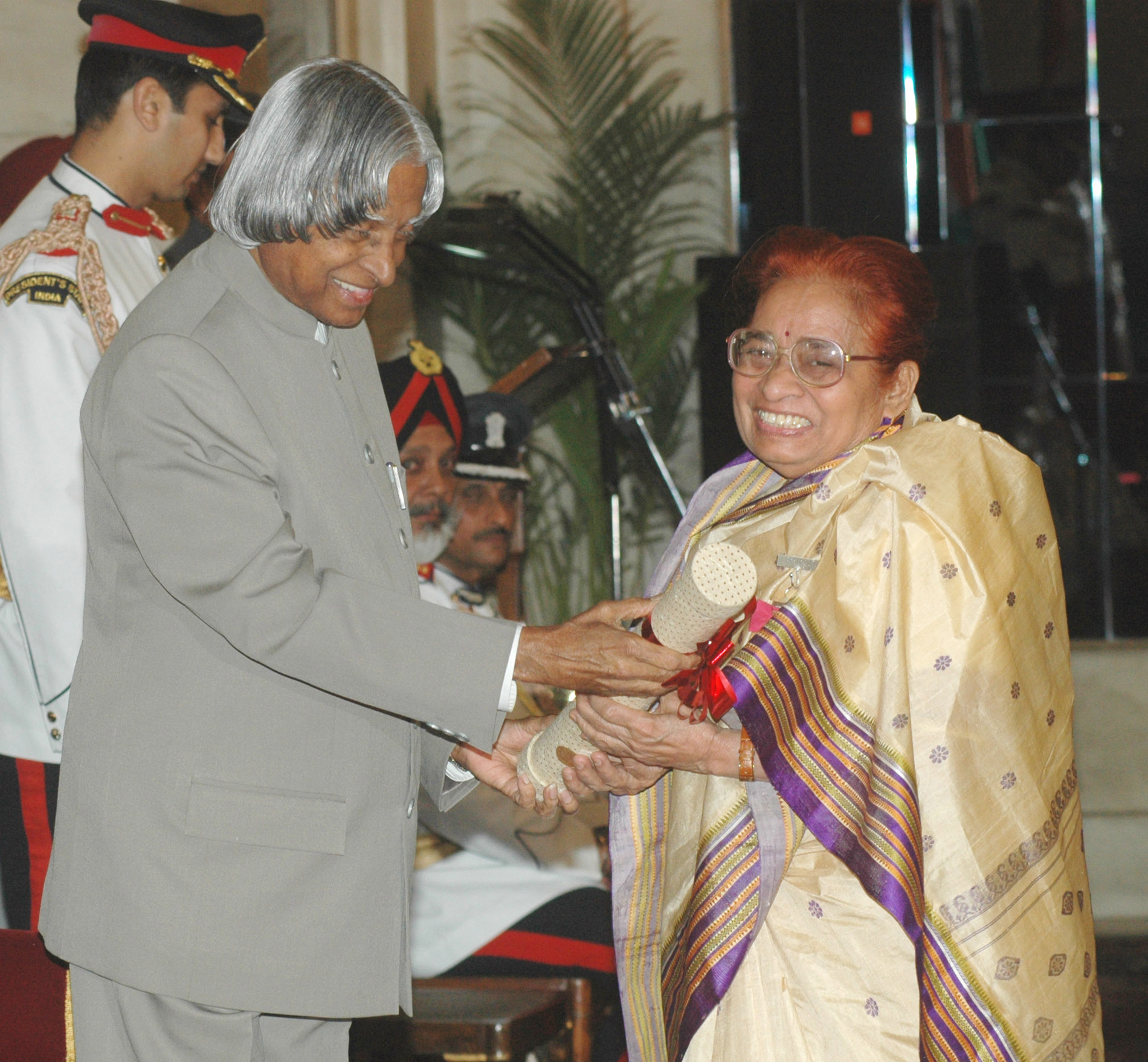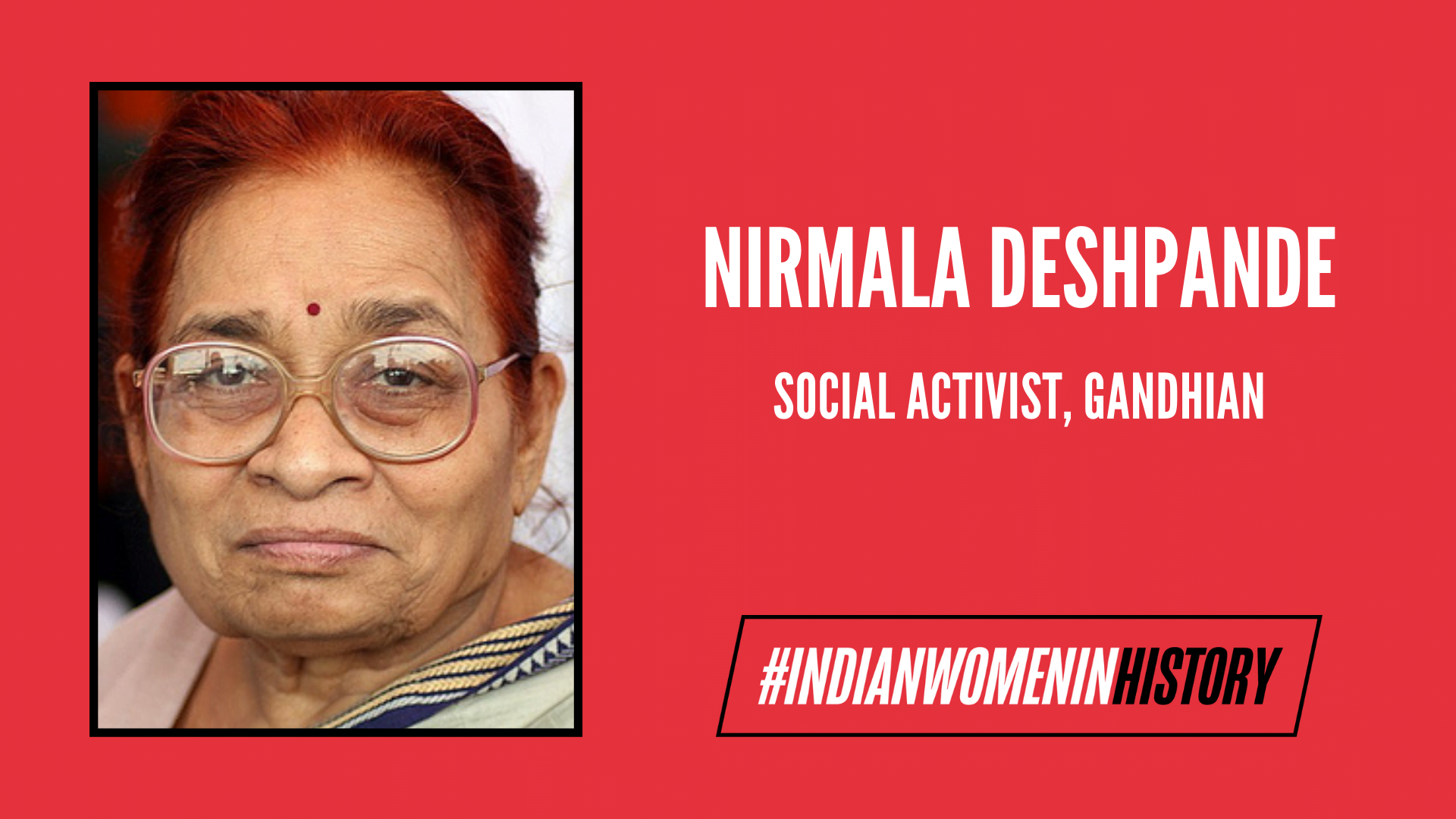It is not news that one’s caste location in the Indian society is intricately connected to one’s socio-economic capital, and the resulting privilege or exploitation. The marginalisation of displaced tribes as a result of modernity and “progress” has already manifested itself in the form of landlessness and deprivation of the most basic resources.
Countless social activists have worked tirelessly alongside the oppressed minorities with the hope of building a better future. One such activist who left an unforgettable mark in the history of Indian politics and activism, and fought tirelessly against systemic oppression, was Nirmala Deshpande.
Born on 19th October 1929 in Nagpur to Vimalabai and Purushottam Yashawant Deshpande, Nirmala Deshpande was a renowned social activist, a former member of the Rajya Sabha, and a devout adherent of Gandhian ideals. She dedicated her entire existence towards eradicating communal violence, empowering women, indigenous tribes, and the oppressed, and building peace between India and Pakistan.

She belonged to a literary background, where her father was a recipient of the Sahitya Academy Award, and her mother translated J. Krishnamurthy’s Commentaries on Life. Nirmala Deshpande herself wrote several books in Hindi. One of her most famous works Seemant, is based on the theme of women’s liberation and autonomy. After pursuing her Master’s degree in political science, she went on to serve as a lecturer in Nagpur.
Having pledged a vow to never marry, Nirmala Deshpande was determined to join Dr. Vinoba Bhave’s Bhoodan movement in 1952. She embarked on a 40,000-kilometre padayatra throughout India to spread the Gandhian ideas of Gram Swaraj. Through the experience she had because of being invested in this movement, she witnessed firsthand the plight of the landless, which further shaped her values.
In 1984, Nirmala Deshpande established the Akhil Bharat Rachnatmak Samaj (ABRS), a coalition of Gandhian institutions and activists, to promote social and communal peace, international peace, brotherhood, and unity. She also founded the journal Nityanutan. This journal was committed to global peace and pacifism, and it was one of the most efficient magazines for spreading non-violent and compassionate ideas of justice
Practising Gandhian ideology was no easy feat, however, Nirmala acknowledged and welcomed the challenges that came along the way. She believed that Gandhian philosophy was the only way to ensure and achieve true long-term democracy in India. Thousands of acres of land donated by those who believed in Gandhian principles were amassed during this momentous movement and delivered to destitute and impoverished people.
Nirmala Deshpande’s forthright views regarding contentious issues often caused a stir in the media. When she announced herself to be a “friend” of the Maoists, it was not widely embraced by many people. Despite being a devoted Gandhian and hence, an impassioned believer in peace and non-violence, it was not difficult for her to understand and empathise with the Naxalites, whose method of rebellion differed vastly from hers.
Nirmala stated that the Naxalites were “fighting for the rights of these [oppressed] people.” She protested against using force when the Left administration was charged with launching aggression on protesters opposing land acquisition in Nandigram, West Bengal. Nirmala Deshpande’s belief in non-violence might seem at odds with her support for the cause of a political movement that was all about armed rebellion, but she was not afraid of voicing her honest opinions, regardless of public perception.
Also read: Maniben Amin: The Gentle Yet Fierce Educator And Freedom Fighter | #IndianWomenInHistory

Nirmala Deshpande’s name also was in consideration for the office of the President of India. Deeply saddened by her death, Shri. Suparno Satpathy, the chairman of Smt. Nandini Satpathy Memorial Trust (SNSMT) said, “Had she not taken ill then, India would have had Nirmala Deshpande as the first lady to take the office of President of India. She was a wonderful soul. Her sudden demise on the 1st of May 2008 was a huge personal loss as well as a great loss to India. 1st of May 2008 shall always remain as one of the saddest days of my life”
Nirmala Deshpande was the president of Harijan Sevak Sangh, a non-profit organisation founded by Mahatma Gandhi in 1932 to eradicate untouchability in India.
In 1984, Nirmala Deshpande established the Akhil Bharat Rachnatmak Samaj (ABRS), a coalition of Gandhian institutions and activists, to promote social and communal peace, international peace, brotherhood, and unity. She also founded the journal Nityanutan. This journal was committed to global peace and pacifism, and it was one of the most efficient magazines for spreading non-violent and compassionate ideas of justice.
Nirmala was also well-known for being a driving factor behind peace rallies in Punjab and Kashmir during periods of high volatility within those locations. Apart from frequently being the motivating force behind national conflict resolutions, she was also recognised for her diplomacy in international matters.
Her peace expedition to Kashmir in 1994 and her attempt to organise a meeting between India and Pakistan in 1996 were two of her life’s greatest accomplishments. Her relentless efforts to sustain peace not only earned her a nomination for the Nobel Peace Prize, but also a Padma Vibhushan Award. She was also awarded the Sitara-e-Imtiaz by Pakistan after her death.
Nirmala Deshpande’s name also was in consideration for the office of the President of India. Deeply saddened by her death, Shri. Suparno Satpathy, the chairman of Smt. Nandini Satpathy Memorial Trust (SNSMT) said, “Had she not taken ill then, India would have had Nirmala Deshpande as the first lady to take the office of President of India. She was a wonderful soul. Her sudden demise on the 1st of May 2008 was a huge personal loss as well as a great loss to India. 1st of May 2008 shall always remain as one of the saddest days of my life”.
Nirmala Deshpande contributed immensely throughout her lifetime to the betterment of the society. However, there is certainly a long way to go before we achieve what she envisioned and hoped for: a “better, peaceful, harmonious and just society“.
Also read: Remembering Jayalalithaa: Six Times CM Of Tamil Nadu & Amma To Tamizh Makkal | #IndianWomenInHistory
About the author(s)
Poulomi is a Master's scholar from Jamia Millia Islamia, New Delhi, who loves to scribble poetry and write essays just when she can't seem to hold it all in. Her research interests include feminist studies, postcolonial theory, trauma and disability studies. She is very eager to read anything she can get her hands on, when she is not obsessing over spicy food or sleeping





